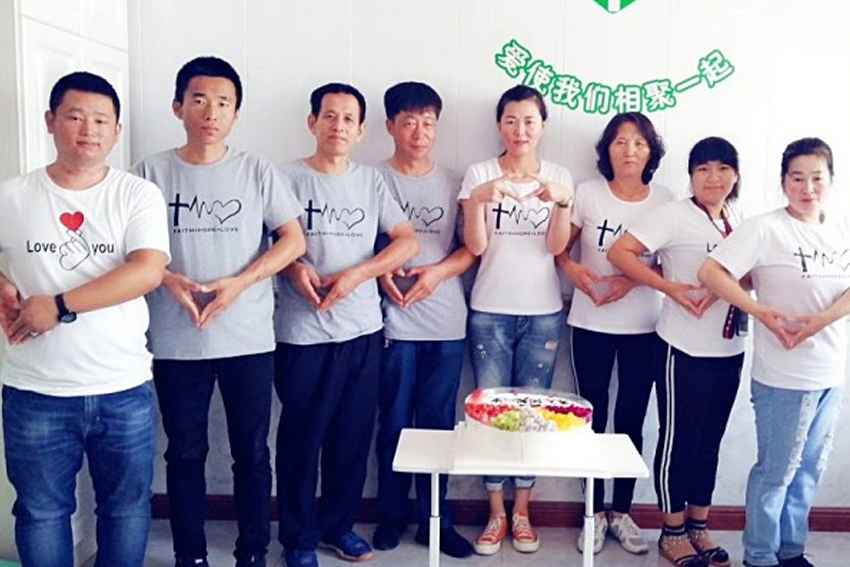It's estimated that there are 70 million deaf people in the world, roughly 95 percentages of whom are functionally illiterate, namely, unable to read or write; there are 400 sign languages; only 20 of the world's 400 sign languages have some form of Bible content available; about 98% of the worldwide population of deaf people have never encountered the real Jesus. In a nutshell: nobody teaches them.
After nearly four decades, the first complete Bible has been available in American Sign Language for those in the deaf community to own a Bible in their heart language the first time. Still, any project on recording the entire Bible in sign language has not started in China.
There is still much work to be done for the deaf ministry.
The second year after my mother became a Christian, she was ordained as a village pastor for her high school education. She has been what she could do to serve the church at the same age of 70.
Influenced by God's older generation servants who were faithful and denied themselves for Him, I vowed to become a full-time pastor before God at my young age. However, the reluctance to serve as a vocational pastor grew stronger inside me as I get older with increased income. But the Lord did not forget our covenant. In early 2014, I was called again to full-time ministry after a retreat. This time I did not put out the Holy Spirit's fire. I resigned from my job and prepared for a seminary entrance exam at home, aged 32.
Starting in the deaf ministry
Once I missed a church's Bible study due to a travel jam, but later a worship service for the deaf fellowship started.
Aware of the unique fellowship's existence, I attended the first-ever worship for the deaf in my life. Since then, I could stay with the deaf believers for their worship after hearing the Bible study. There was a professional translator who interpreted sermons in sign language into spoken Mandarin for ordinary people.
Hearing many sermons translated, I realized that their preaching was very shallow, explaining the meaning of words and phrases most of the time. There had been very little time spent on the truth of salvation.
Every day, the believers told me that most deaf people could not read Chinese characters. Their reading and comprehension skills were equal to the third level of normal primary school pupils, let alone in the early years of less-educated deaf individuals. In the second or third grades, many of them dropped out of deaf schools, so patience was needed to mentor them.
Hearing their explanation, I believed the deaf ministry was quite tricky, mainly hard in the lack of workers. Compared to 27 million deaf people across the country, the number of related ministry staff does not exceed 1,000, including fewer than 500 specialists.
I wondered why God had placed me in a church equipped with a mature deaf ministry and why I knew it. I wanted to join him. But before I took real action, there were several challenges. The hymns that moved me to tears, expressed in sign language, no longer struck me; I failed to find related expressions in prayers; the most challenging moment was the sermon part in which I felt not well-fed. God said to me, "The Lord will satisfy you all needs" through a sister who has been in ministry for years.
The simple word dispelled all my fears. In September 2014, I was enrolled in the Heilongjiang Theological Seminary special education department. Four-year campus life has helped me improve my sign language skills and understand more about their culture and ministries. It wasn't even close enough. Well, I just started.
The beginning of virtual ministries for the deaf
After graduation from the seminary, I moved to my hometown, where there was no deaf ministry.
My hometown is the county seat with subordinate rural areas. In the first year, we went to villages with laptops, preaching the Sunday sermons to rural deaf people. Owing to the long-distance and low transportation, our every visit only covered two towns, while most of the time we were waiting or on the bus.
It was unrealistic for me alone to teach them the Bible as more deaf people in the countryside would come to Christ. Mature co-workers would not be developed in short terms because ordinary people would be trained for three to five years. The virtual pastoral ministry came to our mind.
At first, a series of high-quality gospel cartoons were sent to rural deaf believers while being uploaded on the Internet to be shared with others. It won some hundred clicks in a single day. What was more, many pastors of deaf churches were eager to communicate with me. Through them, I learned that they were poor at sign language, computers, or even theologically trained. I suddenly had a burden for them.
Knowing my efforts incapable of the task, I contacted a seminary classmate who is quite excellent at sign language. I am good at computers while she was awkward at it. We reached a consense that she was responsible for recording sign language preaching. I was in charge of production. We spent half a year making diverse-form videos of Genesis (sign language coupled with words and pictures) circulated among deaf ministry pastors nationwide. Relevant PowerPoint presentations were provided for those pastors who were unable to do exegesis. They received positive feedback.
Deaf ministries require more energies
Online deaf ministries are much more disturbing than we can imagine. Workers need to learn about network operation and video editing. Our online ministry, which has been in place for one year, has studied many methods and approaches suitable for the virtually pastoral care of the deaf.
We are preparing to buy smart TVs that will be distributed to villages where people are deaf. They will go to local churches on Sundays and, via live broadcasts, they can worship with us. In online worship, we also hope to unite with other deaf churches. The biggest problem is that time is limited. My classmate, who has been invited to join other ministries, barely has time to make filmed videos.
For the hearing staff that serve the deaf, this is often a common concern. Church leaders consider the corresponding workload of the ministry to be the number of relevant believers. Co-workers are also assigned to other ministries. I used to serve both the deaf and ordinary believers. Objectively speaking, a deaf ministry needs severalfold time and energy than a regular church.
So I would like to urge every worker to be full-time committed to deaf ministries as we have limited energies. I recommend every church leader not to allocate other typical ministries to those who work for the deaf.
If possible, I appeal to pastors to support mature deaf churches or fellowship workers to subordinate towns and surrounding areas. So many deaf people do not have the opportunity to hear the gospel.
I also encourage my fellow workers not to replace in-person ministries with virtual ones as the former is only the supplementary means. Sincere love for each other and life influence can be realized better in real life.
In the end, I call on my dear brothers, sisters, and fellow workers to enter more closely into deaf ministries so that the grace of the "Ephphatha" performed by the Lord Jesus may fall upon every deaf person through us.
(The original article is published by Gospel Times.)
- Translated by Karen Luo












